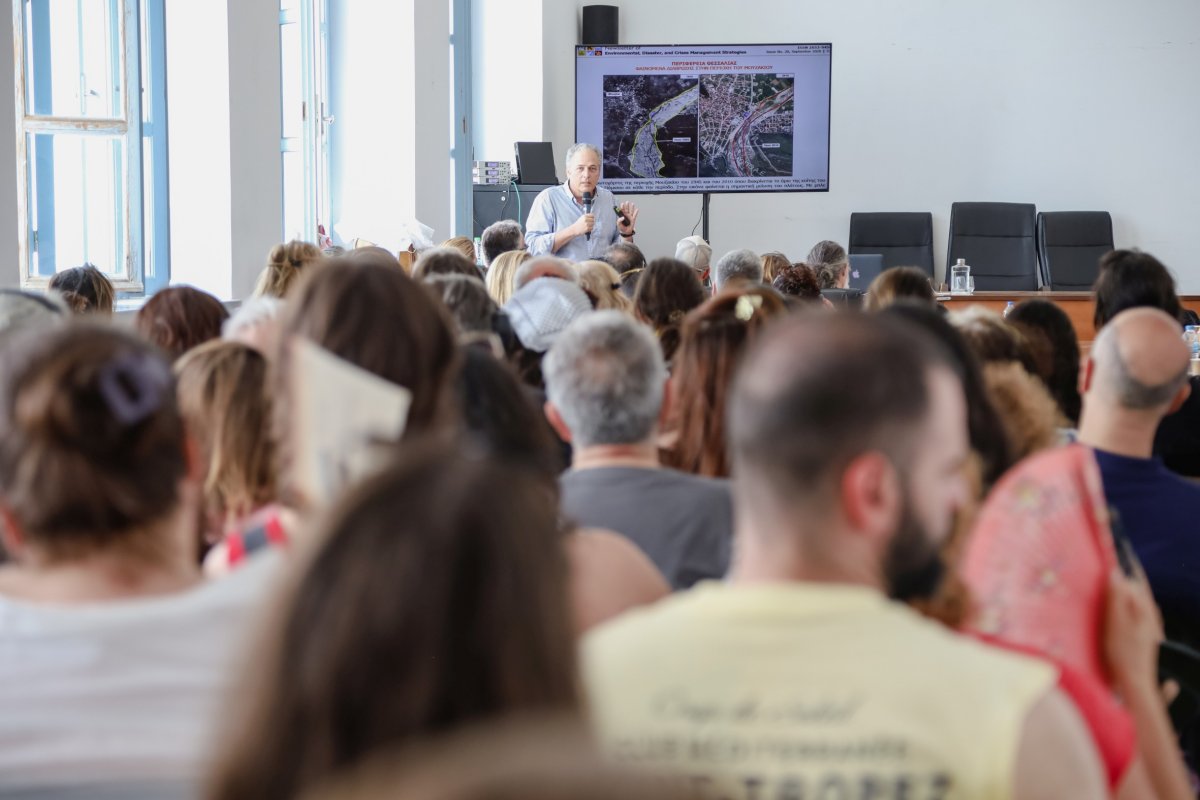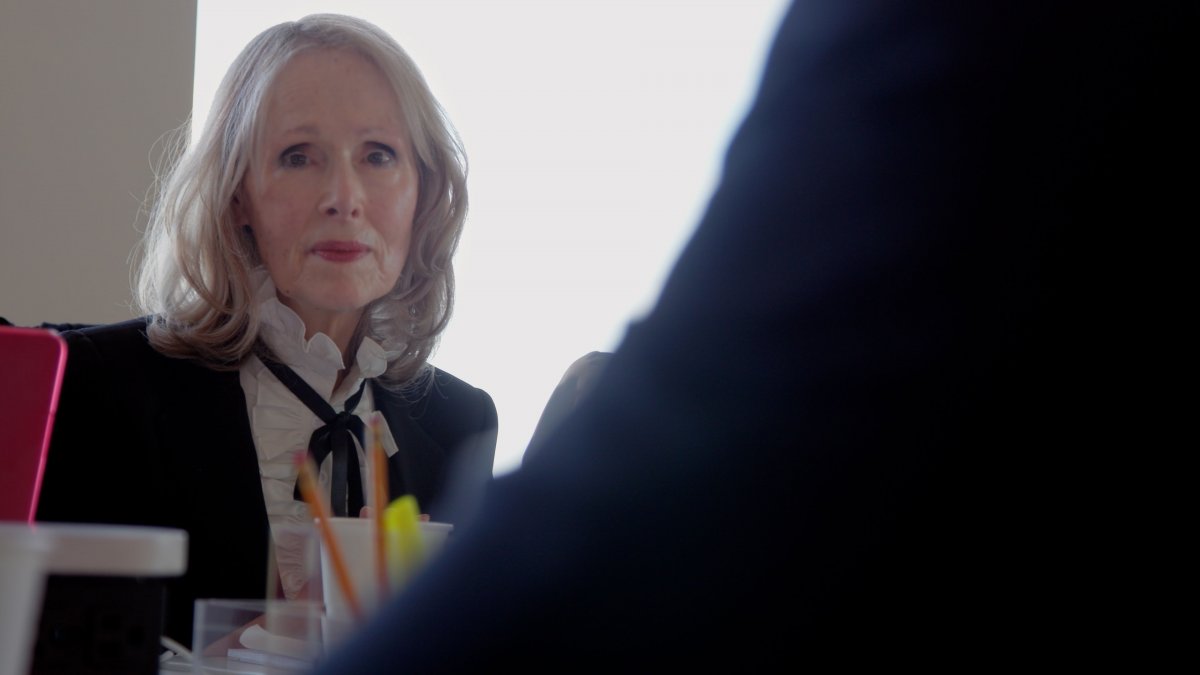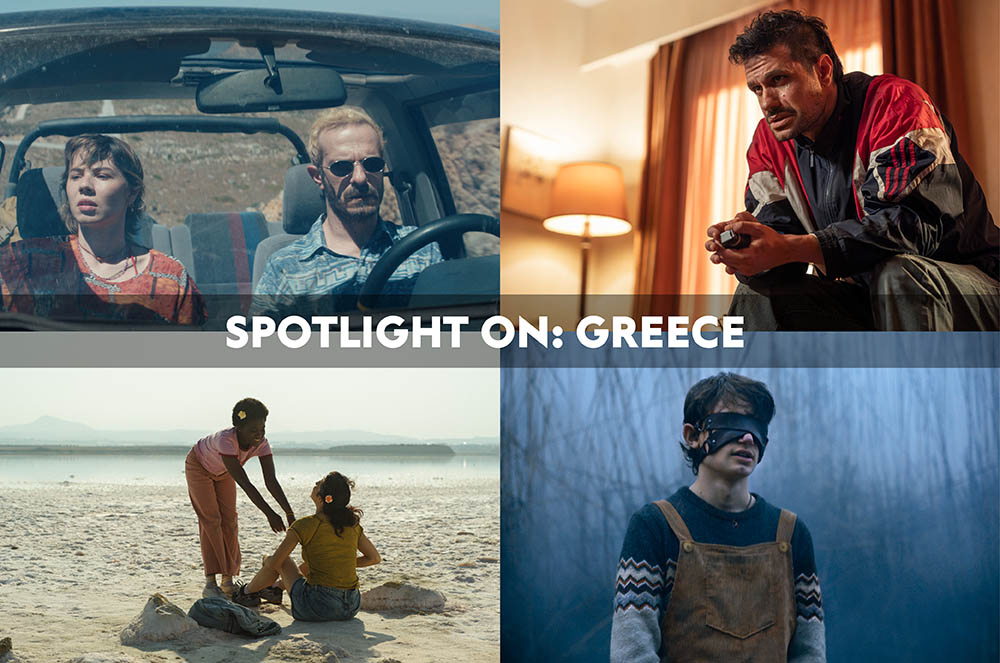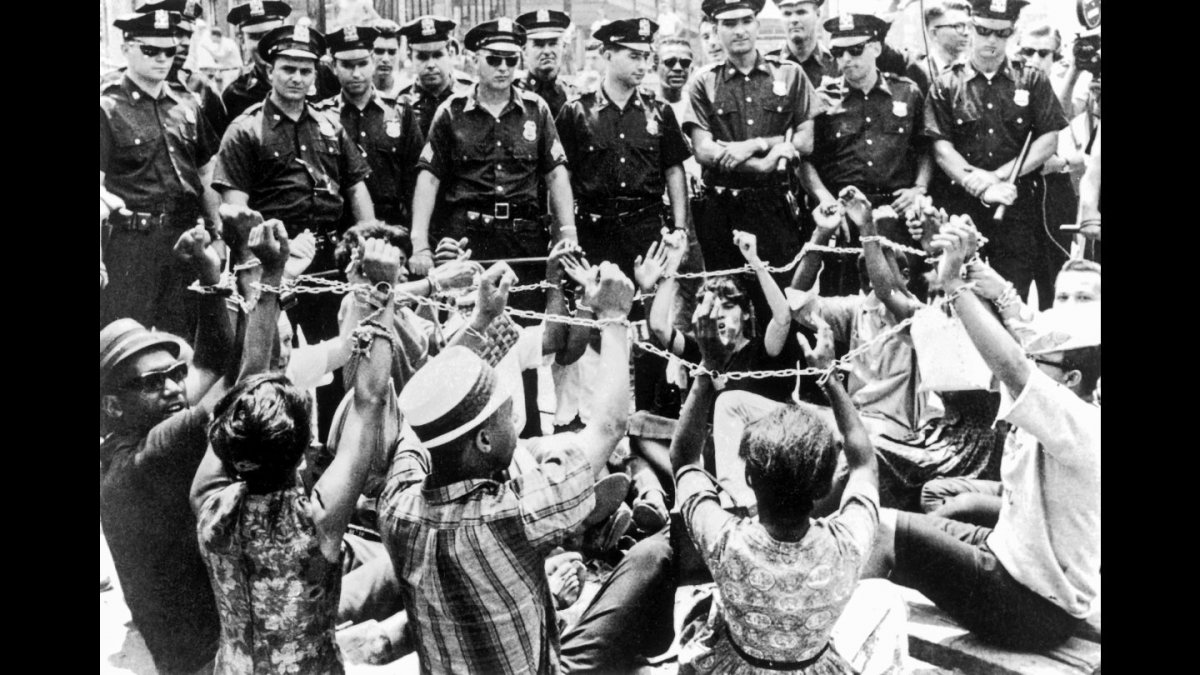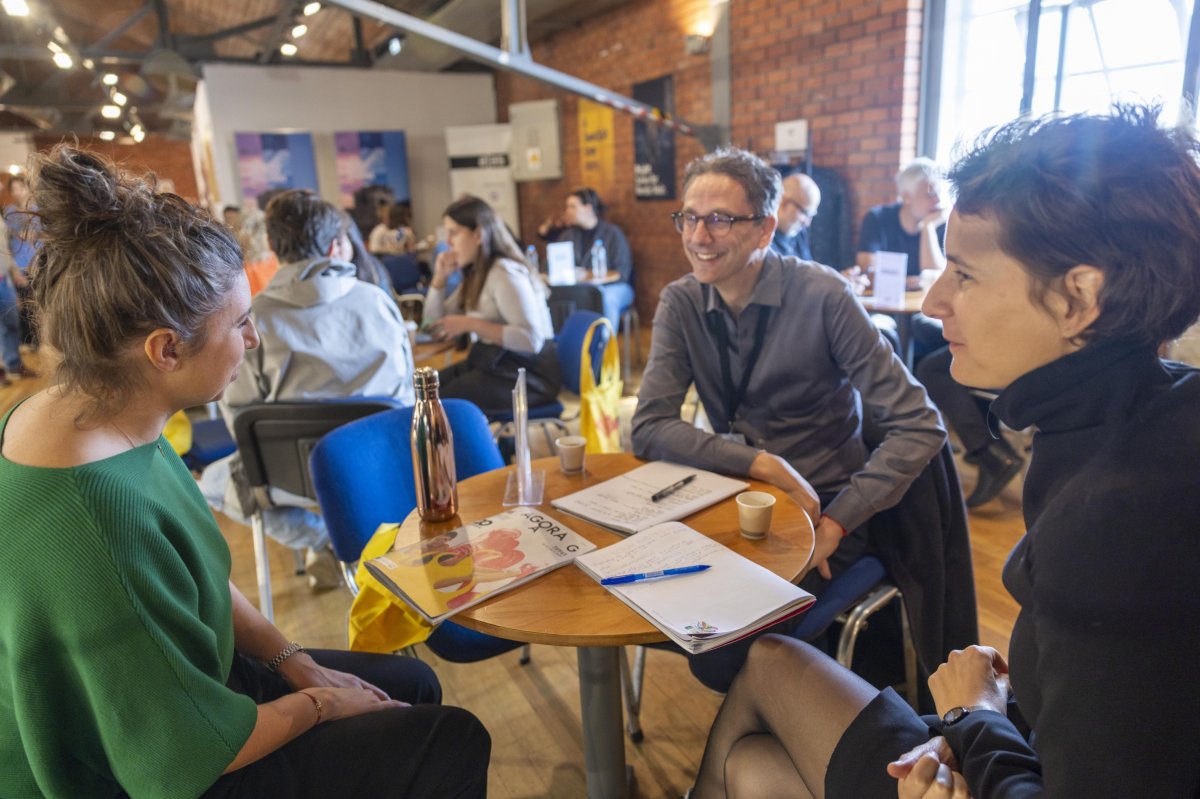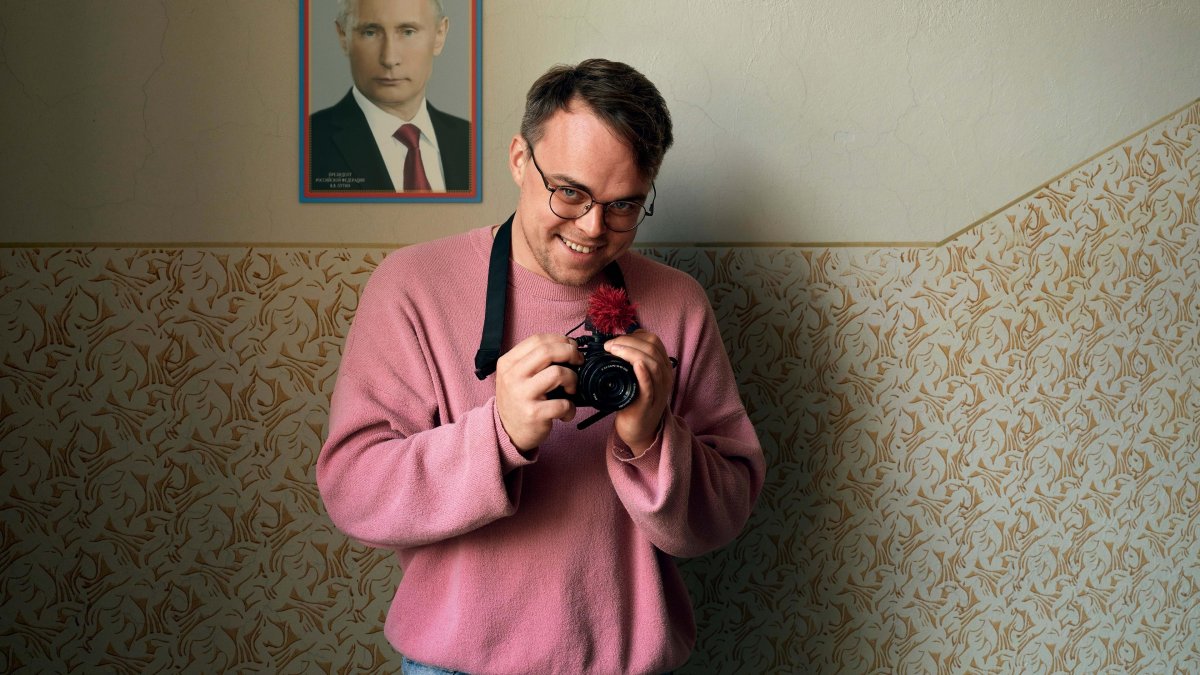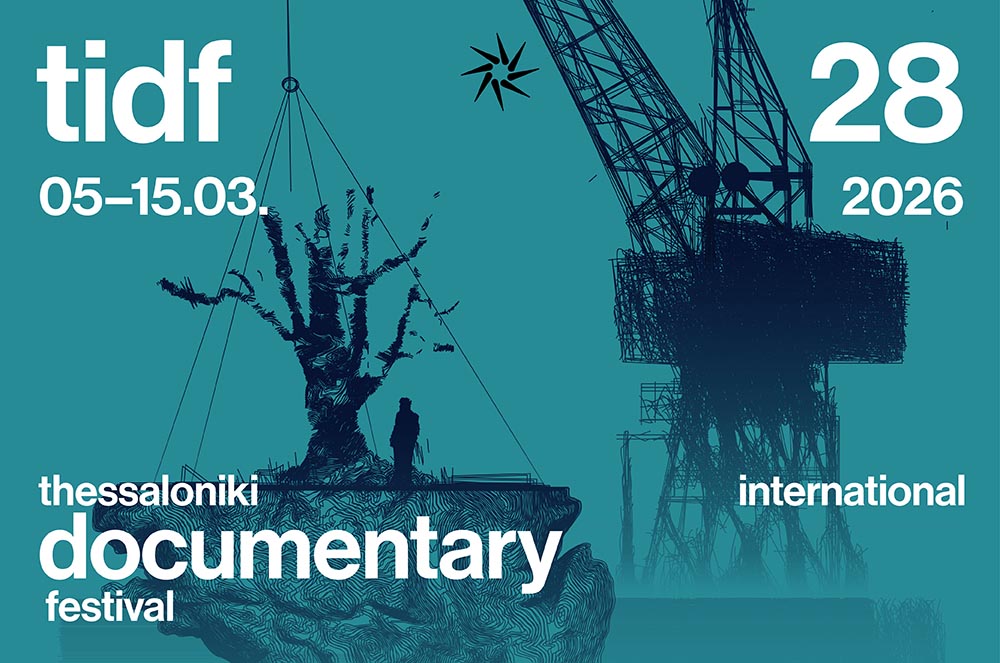An all-day discussion delving into the cinematic universe of the Greek summer was held within the framework of the 4th Evia Film Project, an initiative dedicated to green cinema, organized by the Thessaloniki Film Festival with the support of the Ministry of Culture. During the discussion entitled “Filming the Greek Summer: Light and Myths, Stereotypes and Challenges,” issues such as sustainability, tourism, the construction and deconstruction of the stereotypes that have shaped the Greek summer, as well as the conditions that make filming during summer a rather demanding endeavor were explored. More than 250 guests embarked on a journey by boat from Edipsos to Limni, discovered the breathtaking coastline of Northern Evia, and upon arriving in Limni, attended the event at the Mela building.
Orestis Andreadakis, the Festival’s Artistic Director, initially thanked the audience for their attendance and referred to this year’s thematic core, the Greek summer: “We wanted to redefine the Greek summer and reflect on what living it truly means. Thus, we pondered the changes it has undergone over the past few years, its sustainability, as well as the effects that overtourism, overfishing, and overconsumption have on it. How much more can we live within it? And of course, we also thought about the issues that directly concern us, as people in the film industry; how films are shot during the Greek summertime, how the Greek light is captured through the camera lens, and how our productions can become more sustainable,” he stated. Next, he briefly introduced the speakers, before giving the floor to Konstantinos Kartalis, Professor of Environmental and Climate Physics at the National and Kapodistrian University of Athens, member of the European Union's Scientific Committee on Climate Change.
Konstantinos Kartalis thanked the Festival for the invitation, the Evia Film Project initiative, and the formation of an institution in Evia. His presentation was a journey through the past, present, and future of the Greek summer. He focused on describing the effects of climate change on the Greek summer, the ways it has transformed over the last 30 years, as well as its projected change in the future.
“What do we have to do to keep our summer carefree?” he asked at the beginning, setting the stage for the discussion. He stressed that the summertime is constantly lengthening, snatching days away from the spring and fall, and emphasized that this development is anything but a cause for celebration. “We observe a continuous temperature increase, with heatwaves sweeping through the months of May and September. We can predict the rise in temperature in this climate hotspot known as the Mediterranean by using models,” he explained. Immediately afterwards, taking the islands of Santorini and Mykonos as an example, he pointed out thermal irregularities observed in these tourist attractions, which can no longer maintain their ecosystem due to poor management.
At this point, he spoke about the issue of fires, showing pictures of the devastating fire that occurred in Evia during the summer of 2021: “We have always had fires in Greece, but in recent years they have become quite aggressive. Over the past 30 years, there have been days where heatwaves and droughts happen simultaneously. A fire is not caused by climate change, but it is a result of various factors, often anthropogenic. However, once a fire erupts, it is difficult to extinguish,” he stressed, drawing attention to the fact that often the cause of the catastrophe isn’t climate change itself, but poor planning. He also brough up the revival of the natural landscape in Evia, where, four years after the fire, vegetation has started to grow vertically, with real trees developing.
Later on, he touched upon the rise in sea temperatures which affect biodiversity, as well as marine heatwaves which have a lesser impact on the Mediterranean due to the beneficial meltemi winds traversing the Aegean: “Tragically, and partly due to the fires, strong winds take on a different, negative connotation. However, the truth is that meltemi winds are beneficial for sea temperatures.” He then went on to discuss the human encroachment into natural structures, such as the construction of apartment buildings along the coastline, and the harmful elements such as the crepidomata, found along the Greek coastline in places where the waves should naturally subside.
Next, he spoke about the urban summer, describing it as a ‘nearly doomed issue’: “Nowadays, in Greece, we experience tropical nights, meaning that the temperatures in the evenings are above 25 degrees Celsius. The temperature rises even more in the cities owing to their manner of construction.” Observing the thermal analysis of the Municipality of Athens, he introduced a new social divide to the climate crisis, explaining that the neighborhoods where lower income residents live have a higher thermal risk. He also mentioned the issue of a region’s carrying capacity, drawing the audience’s attention to the conditions that must be adopted, as well as to the major decisions that are unlikely to become a reality in the near future but must be made to effectively deal with the climate crisis.
Finally, addressing film industry professionals, he emphasized how crucial their role is in delivering a powerful message to combat the climate crisis. “The one thing you must take away from this presentation is that the issue remains reversible, but certain decisions must be made, and they must be made urgently,” he stated, wrapping up his speech by wishing the audience a great summer.
Next, film directors Sofia Exarchou (Animal), and Argyris Papadimitropoulos (Suntan), along with cinematographer Simos Sarketzis participated in a discussion moderated by film critic Christos Mitsis (Athinorama magazine). The filmmakers shared their own artistic paths with the audience, and their summer shooting experiences while filming in Greece. They divulged each one’s approach to capturing the Greek light, and analyzed how demanding the production conditions are during the summertime.
Initially, moderator Christos Mitsis stated that the conversation would examine both the aesthetic facet, and the practical level. “Greek summer is essentially the country’s greatest export. What does this mean for filmmakers? That as artists and creators we can exploit this. But in reality, is Greek summer truly something so unique?” Sofia Exarchou was the first to take the floor to discuss the depiction of the Greek summer in her film Animal, the Golden Alexander recipient of the 64th Thessaloniki International Film Festival. “In Animal, you won’t find a carefree Greek summer. On the contrary, the film follows the employees of a hotel, individuals dwelling on the periphery of summer. Their days are more darkness than light; beautiful, sunlit days are lacking,” she remarked. She also noted that filming took place in the middle of October, highlighting the difficulty of shooting during the summer season due to the challenges of acquiring the necessary permit, as well as the high costs.
Subsequently, Argyris Papadimitropoulos spoke about his film Suntan, and the shooting on the island of Antiparos during the summer: “We wanted to make Suntan a bright film, filled with interior darkness, numerous night shots, sweaty faces after the night clubs, and real parties. Filming took place during the summer because we had no money to pay for extras, so we used the people that were on vacation instead. We saw that Antiparos is quite small and can accommodate a handful of people, but unfortunately, it has thousands of visitors each year overwhelming the island,” he stated.
Immediately afterwards, Simos Sarketzis referred to the great responsibility each cinematographer takes on in order to accurately convey the vision of the Greek summer: “As a cinematographer, I have to picture the Greek summer. But what is it precisely? The position of the sun is the same everywhere, whether it's Tokyo, or San Francisco. I consider Greek summer to be a blend of different things, not exclusively having to do with light. The Greek summer certainly requires stamina from us, and durability from the materials. 40 degrees doesn't please the camera sensor, nor the film. During the peak summer season, a shoot might last up to 18 hours, including the preparation.” Concluding his commentary on the challenges of the Greek summer, he added: “The main question is whether and to what extent we can bear it.”
In response to Christos Mitsis’ question on the difficulties of shooting during the summer, Sofia Exarchou said: “I think the Greek summer poses more of a challenge for other professions than it does for filmmakers. The truth is that as tourism develops, filming conditions will become increasingly more challenging, while costs will keep rising.” Next, she highlighted the differences between Greek and international productions, seeing as the latter ones have larger amounts of money at their disposal. On the mythology of the Greek summer, she stated: “I don’t think we make films to promote a country’s image, but to tell a story. A foreign director may approach Greece and the Greek summer in an idyllic and picturesque manner, just as we would if we were shooting in a region abroad. But we can draw inspiration from it in various different ways, and avoid following the mainstream narrative.”
Argyris Papadimitropoulos reiterated that the islands have reached their limits: “I believe they have no room for more people, or for the tourists that visit them. Think about the difficulty of having to burden the island with a production featuring 70 people.” On the subject of the Greek summer and its depiction, he mentioned that he seeks something different from the dominant narrative, even though he really liked the fact that many people were fascinated by a different aspect of Antiparos, a side they discovered through Suntan, and wished to see for themselves.
Finally, Simos Sarketzis noted that the Greek summer has lengthened a lot: “Summer in our country extends from May to early November. Which means that the space is available for filming even off season, thus accommodating the low budget of Greek productions.” As for the best way to capture the Greek summer, he clarified that he prefers to bring to the foreground different elements beyond the obvious and those reminiscent of postcards.
The all-day discussion concluded with the presentation entitled “The Land as a Skylight, the Gaze as a Bind” by poet Yannis Antiochos, who explored the relationship between the gaze and the Greek summer light, as inscribed in memory and landscape. Yannis Antiochos examined the ways the harsh and unforgiving light of the Greek summer both restricts and sets our vision free, while attempting to approach, in a poetic manner, the experience of the intermediate light, a light that isn’t harmful, but healing.
Mr. Antiochos thanked the Festival for the invitation, disclosing that for him, the light of the Greek summer is unbearable: “This light isn’t warm, it’s overwhelming; it doesn’t light the way, it corrodes it. Growing up, I understood that the sun wasn’t the issue. The issue was all that it reveals. Summer in Greece isn’t a season; it’s a regime of light. Luminosity doesn’t bring clarity; it brings heartache, and that’s precisely where the essence of the Greek experience nestles.” Next, he read certain excerpts from the works of Giorgos Seferis, the great Greek Nobel Prize-winning poet, who “had also experienced the burden of the Greek summer light.” As a result, it escaped from the dominant narrative in his descriptions.
According to Yannis Antiochos, “Greek light does not enable you to see; it demands that you turn your gaze away.” The poet likens the holidaymakers to the prisoners in Plato’s “Allegory of the Cave,’ when they emerge from the cave and encounter something unprecedented and primitive: “They are unable to bear a luminosity they do not yet comprehend. Greek light is harsh, vertical, it lacks a transitional phase. Our country is filled with blinds, shutters, and curtains in the cities. This isn’t a sign of inertia, but a form of protection. Not only from the heat, but for our vision as well. Light infiltrates, and the sea serves as a reflection, multiplying it.” According to the poet, this is the real challenge when making Greek cinema. This excessive brightness forces the majority of producers to film under the mellow light of fall, as the sunlight in July “devours, seems other-worldly, and cannot pass for art.”
“Growing up, I understood that summer light is essential, as long as it is sustainable,” Yannis Antiochos added. “There is no greater challenge than staying in the light, where you have nowhere else to turn. The light is riveting, holding me captive, as it does to us all. I often think that the term ‘sustainable’ is inelegant and technocratic, but the truth is, we have forgotten that our lives were once simpler and much more vulnerable. The summer light urges you to learn to see. In the motionless hour of noon, the most substantial form of sustainability is silence. Sustainability means to last despite the exposure. Similarly to the sea, we reflect light. We cannot hide, we seek the intermediate light, the one that does not burn,” he concluded, wishing the audience “a good summer, just one day before the summer solstice.”
After the event, the guests of the Evia Film Project had the opportunity to wander around the stunning village of Limni and taste the local cuisine, thus bringing to a close, in an ideal manner, a day dedicated to our beloved cinematic summer.
The trip from Edipsos to Limni was graciously sponsored by the Evia Island Port Authority, and the Elisabet Cruises company. The Festival would like to express its gratitude for the wonderful trip aboard the Elisabet ΙΙ ferry, which transported the guests of the Evia Film Project. The Festival also extends its thanks to the Edipsos Port Authority for its invaluable support, and especially to its Harbormaster, Sotiris Danikas.


